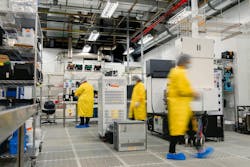SpaceWERX awards Solestial $1.2 million contract to advance fast-build solar array technology
Summary points:
-
Solestial was awarded a $1.2 million Direct-to-Phase II SBIR contract from SpaceWERX to develop a fast-manufacturing solar array wing for small satellites using its radiation-hardened silicon solar technology.
-
The project includes a one-month sprint to produce and assemble a 1-kilowatt solar array, demonstrating rapid production timelines critical for defense and space readiness.
-
Solestial’s flexible, low-mass solar modules self-heal from radiation damage and are designed for up to 10 years in space, offering a scalable alternative to traditional III-V solar cells.
TEMPE, Ariz. - SpaceWERX, the innovation arm of the U.S. Space Force and a unique division within AFWERX, has selected Solestial, Inc. in Tempe, Ariz., to develop a novel, fast-to-manufacture, multiorbital solar array wing concept for small satellites.
The Direct-to-Phase II contract in the amount of $1.2 million will enable Solestial to optimize its low-mass, radiation-hardened silicon solar cells and solar power modules for fast integration and assembly; develop novel module electrical interconnectors; and build and test a complete solar array wing. The company supplies its flexible, radiation-hardened solar modules and arrays to both commercial satellite operators and government agencies.
The effort will conclude with a two-week manufacturing sprint to produce 1 kilowatt of solar cells and modules, followed by a two-week integration phase to assemble a complete solar array wing. The goal is to demonstrate the ability to produce and assemble a space-ready solar array within a single month.
NASA selects Solestial for space solar array
The award is part of the Department of the Air Force’s Open Topic SBIR/STTR program, which has funded a broader scope of innovations since 2018. The initiative aligns with Solestial’s objective to advance rapid, scalable energy solutions for U.S. national defense applications.
"This is a meaningful award for us that will result in critical research and development benefiting the U.S. Space Force," said Margo de Naray, CEO of Solestial. "Long manufacturing lead times have plagued the incumbent solar technology for space. Through our use of affordable, accessible silicon and automated manufacturing of solar cells and solar power modules, Solestial is uniquely positioned to solve this critical bottleneck and support mission readiness."
Solar power
Solestial’s proprietary silicon solar cell technology is designed specifically for space applications. The cells can self-heal from radiation damage under sunlight and at operating temperatures as low as 65°C. They are integrated into ultrathin, lightweight, flexible modules engineered for mission durations of up to 10 years in low Earth orbit, geosynchronous orbit, cislunar space, and beyond. The modules are produced using automated manufacturing processes that reduce costs compared to traditional III-V multijunction solar technologies.
To date, Solestial has secured more than $7 million in SBIR contracts from the U.S. Space Force, U.S. Air Force, Air Force Research Laboratory, the National Aeronautics and Space Administration (NASA), and the National Science Foundation.
About the Author
Jamie Whitney
Senior Editor
Jamie Whitney joined the staff of Military & Aerospace Electronics in 2018 and oversees editorial content and produces news and features for Military & Aerospace Electronics, attends industry events, produces Webcasts, and oversees print production of Military & Aerospace Electronics.
